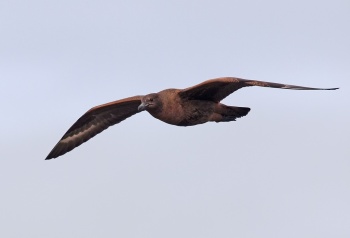m (→Taxonomy) |
(→Taxonomy: Update link) |
||
| Line 24: | Line 24: | ||
[[Image:Skua116798.jpg|thumb|350px|right|1st year<br />Photo by {{user|birdingberlin|birdingberlin}}<br/>Brokdorf, [[Germany]], October 2011]] | [[Image:Skua116798.jpg|thumb|350px|right|1st year<br />Photo by {{user|birdingberlin|birdingberlin}}<br/>Brokdorf, [[Germany]], October 2011]] | ||
==Taxonomy== | ==Taxonomy== | ||
| − | [[Dictionary_M- | + | [[Dictionary_M-O#M|Monotypic]].<br /> |
Has been placed in the genus [[:Category:Catharacta|''Catharacta'']] with the other large skuas (Sibley & Monroe, 1993; Clements, 2000). | Has been placed in the genus [[:Category:Catharacta|''Catharacta'']] with the other large skuas (Sibley & Monroe, 1993; Clements, 2000). | ||
Revision as of 22:16, 29 June 2014
Alternative name: Bonxie
- Stercorarius skua
Identification
Length 57-59cm. A large and heavy skua.
Adult
- Overall dark brown
- Large white primary patches above and below (visible only in flight as wing flash))
- Powerful head and neck, heavy bill
- Cream-coloured streaks on nape, neck and mantle
- Broad central tail-feathers with rounded tips, not (or only slightly) projecting
- Soars more often than other skuas
1st year
- More uniformely brown with reddish tinge
- White primary patches less prominent
- Heavier body and more powerful flight than juvenile gulls
- No light cross-barring, heavier body and more powerful flight compared to juvenile Pomarine Skua
Distribution
Breeds in Iceland, the Faroes, northern Scotland (common on the Shetland Islands), Norway (including Svalbard, Jan Mayen and Bear Island) and around Kola Peninsula in northwestern Russia.
Winters mainly off the coast of northern Spain and Portugal but also along the coast of Western Africa, in the Mediterranean, off the east coast of North America and south to Brazil.
Taxonomy
Monotypic.
Has been placed in the genus Catharacta with the other large skuas (Sibley & Monroe, 1993; Clements, 2000).
Habitat
Open ocean near coastlines.
Quite common on the Shetland Islands, living on moorland and hill tops. There are 400 breeding pairs on the Island of Noss, and this is one of the biggest populations in the world today.
Behaviour
A scavenger who is not above stealing food from other seabirds.
They are very protective of their nests and young, and they will attack at any opportunity, but, they will push rather than attack with their sharp claws or very sharp beaks. They nest in what is known as 'Scrapes' in the ground, obviously to give protection to their young.
References
- Del Hoyo, J, A Elliot, and J Sargatal, eds. 1996. Handbook of the Birds of the World. Volume 3: Hoatzin to Auks. Barcelona: Lynx Edicions. ISBN 978-8487334207
- Clements, JF. 2011. The Clements Checklist of Birds of the World. 6th ed., with updates to August 2011. Ithaca: Cornell Univ. Press. ISBN 978-0801445019. Spreadsheet available at http://www.birds.cornell.edu/clementschecklist/downloadable-clements-checklist
Recommended Citation
- BirdForum Opus contributors. (2024) Great Skua. In: BirdForum, the forum for wild birds and birding. Retrieved 3 May 2024 from https://www.birdforum.net/opus/Great_Skua






